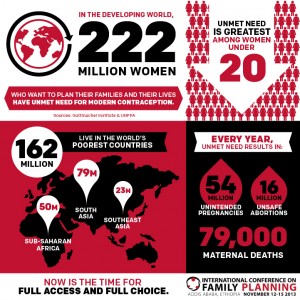Turning Up the Heat on Family Planning
Nov 29th, 2013 | By admin | Category: Climate ChangeBy Suzanne York, www.howmany.org
The third annual International Conference on Family Planning ended in mid-November with a focus on successful initiatives and with momentum to enact voluntary family planning services and education for people around the world.
The breadth and depth of work undertaken by professionals and activists is exciting. From addressing maternal mortality to involving men in family planning to sex education for youth via mobile texting, there are many promising and innovative ideas for building healthy lives.
The need, of course, is great. In the developing world, 222 million women who want to plan their families and their lives have an unmet need for modern contraception. Among these, 162 million live in the world’s poorest countries. And the unmet need is greatest among women under the age of 20.
Yet some big picture issues seemed to be either missing or just touched upon at the conference, namely climate change and the environment. This was a bit surprising, in the aftermath of Typhoon Haiyan, which had just hit the Philippines. Family planning, women’s empowerment, and the environment are intrinsically linked.
The integrated PHE, or population, health and environment approach, did figure into some talks and side events, which is very encouraging. And some noted that PHE “had a strong showing.” But given what is at stake, and with the reality that the world is on course to warm 2 degrees Celsius by 2050, more sessions – and especially plenary and keynote talks – should have prominently included climate change and environment issues.
Case in point, the demographic dividend. Ethiopia’s economy is now sub-Saharan Africa’s fifth biggest economy, and talk of a demographic dividend was frequently heard at the conference. There were several demographic dividend workshops on the program, and at least one did mention the environment. But in another session, with experts from Harvard, the World Bank, and the UNFPA, climate change did not come up. This, despite the fact all speakers gave compelling speeches on the potential of the demographic dividend, especially for Africa.
The World Bank statesthat “Climate change will have serious and adverse consequences for many development sectors in Africa, and threatens the economies and livelihoods of many African countries.” If Africa is to realize the demographic dividend, then climate adaptation and mitigation must be part of the discourse.And in its report Turn Down the Heat, the World Bank notes that “significant yield reductions already evident under 2 degrees Celsius warming are expected to have strong repercussions on food security and may negatively influence economic growth and poverty reduction in the region” (of Sub-Saharan Africa).
And what about the issue of land grabs, a growing problem across Africa? Land grabs are defined as “the purchase of vast tracts of land from poor, developing countries by wealthier, food-insecure nations and private investors.” Corporations and governments want access to Africa’s natural resources, and the impacts are already being felt in many countries. And the global economic system itself, predicated on ever more growth in a world of finite resources, is unsustainable.
Certainly the ICFP was meant to emphasize family planning and can’t cover every topic, but recognizing the need for holistic, integrated approaches that address pressing issues such as climate change is necessary. Voluntary family planning services can and must be brought to everyone, but what does this mean in the face of increasingly severe climate effects? It’s a huge issue, and one that should be at the table for the next conference on international family planning, two years from now.
Suzanne York is Senior Writer with the Institute for Population Studies and attended the 2013 International Conference on Family Planning in Addis Ababa, Ethiopia.



